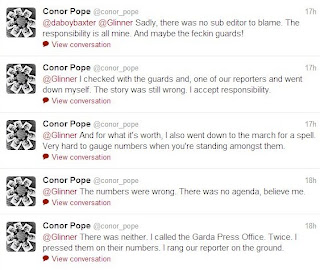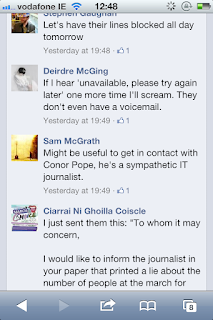Well, the #march4choice that took place
yesterday (29th September) in Dublin definitely justifies a
blogpost.
What shenanigans! Pro-choice
advocates are entitled to peacefully protest, and are entitled to their day out
as it were, as are pro-lifers, but the chaos that reigned in the Irish Times'
reporting of the event in the late afternoon and evening yesterday could be the
subject of a dissertation.
While I don't have time for that, I do
want to record some of what happened for posterity.
I hope the below is comprehensive.
If you feel you can add or clarify anything please feel free to
comment below.
The March appeared to pass off
peaceably. A fairly small crowd (several hundred) gathered at 2pm at the
Spire and started walking after 2.30pm. The crowd grew as people
joined the March as it progressed. None of this is controversial.
There doesn't appear to have been much
media coverage of the event from the start despite the fact that Press Releases
were sent according to conference organisers. There was no mention of the event
on RTÉ and no mainstream newspaper reporting save the Irish Times. The
fact that RTÉ didn’t report on it was the first hint that the turnout was lower
than expected. So what exactly was the story with the numbers?
According to a tweet from Conor Pope,
of the Irish Times at 11.27pm last night,
'Initially I was told that around 500
were there. At 7.30pm I double-checked and that was confirmed'
As a result of the initial information
(note the double checking happened after the initial Irish Times article went
online) and discussion with Gardaí on site, an article was published on the
Irish Times website after the March ended at 17.50pm with the headline 'Low
turnout for 'pro-choice' rally'. That heading was not unusual given
the level of planning and the publicity that the March had garnered including a
piece in the Irish Times itself posted at 16.34pm on Friday evening
entitled 'Pro
Choice Rally expects Thousands'
The original report on the Irish Times
website was posted on 17.50pm on Saturday evening. This article has been removed but you can
read the original report (a screenshot) in full below
It's fair to say that subsequent to
this article being posted, marchers and supporters of the march took to social
media to berate and pressurise the Irish Times to increase the figures.
Part of this included the spreading online of a YouTube video uploaded by
@darraghdoyle. I've embedded it below.
In fairness, I would agree that there
are more than 500 people on this video. There probably is nearer to 800.
There are not however 'Thousands' as
reported in later version of the Irish Times story or indeed 5,000 as tweeted
by Labour Party Senator Ivana Bacik!
And there certainly is not 5,000 -
7,000 as tweeted by March organiser Sinead Redmond!
Question - Did choice advocates
generally agree with the initial lower figures?
(i) March for Choice speaker
@ariel_silvera's tweeted at 7.51pm last night and said that from standing at
podium, she could see 1500 at least
Incidentally @ariel_silvera changed her
tune today when she tweeted that the Irish Times had changed their 'early crappy report on the
#march4choice Thousands attend pro-choice rally'
(ii)
@rallyforchoice had already started justifying the bad attendance last
night, and indeed had started a hashtag entitled #lessthanathousand under which
they tweeted things like 'Less
than a thousand people built the pyramids' - a fair sentiment. It would be
unusual for @rallyforchoice to be tweeting something like this if they really
honestly believed that there were over 2,000 in attendance surely?
(iii) @wendylyon a well-known choice
activist also justified the low numbers tweeting @conor_pope '500 still more than any
pro-choice rally in ten years' That
is true.
Question - Why did @conor_pope and the
Irish Times second-guess themselves?
What inspired the numerous phone calls
from Irish Times journalist @conor_pope to the Gardaí? Is it normal for
the Irish Times to ask the Gardaí, not once, not twice but three times about
their figures. And is it normal for the Press Office to be consulted on
this as opposed to local Gardaí? Or was there external pressure on
@irishtimes and @conor_pope. Let's have a look.
Graham Linehan is a well-known comedy
writer (of Fr. Ted fame, IT Crowd etc) and importantly, he has over 218,000
followers on Twitter. So when he tweeted yesterday evening ( around 9pm )
that ‘The Irish Times is a f*+$ing rag’ (except he used the full word),
it's not surprising that some people got a little nervous. He has since
deleted that tweet but a simple google search brings it up. This screen
grab is taken at 16.37 on Sunday, 30th September.
Tweet from @conor_pope sent last night
that confirms the @glinner pronouncement about the Irish Times
Graham Linehan subsequently entered
into a conversation with @conor_pope the journalist who is accepting
'responsibility' for the initial 'incorrect' story. It's clear the Irish
Times felt under pressure from @glinner. How he could have so much information
on the numbers on the march when he doesn't appear to have been in attendance
is another question altogether? There was a bit of over and back between
the two on Twitter with @conor_pope sending no less that five tweets to
@glinner 'justifying' the earlier Irish Times story. Why would an Irish Times journalist feel the
need to justify the Irish Times’ report to a comedy writer?
At the same time, back home, the Unlike
Youth Defence Facebook page (which I understand is manned by some of the
organisers of the #march4choice - though am happy to be corrected on this)
decided to launch their own lobbying campaign against the Irish Times.
They tweeted at 19.37 'Can anyone
who can contact the Irish Times ASAP to demand that they issue a correction and
ideally apology for this factually incorrect - or, as we like to call it,
lying- piece'
A contributor to the same page
suggested that people should contact Irish Times journalist @conor_pope and
referred to him as a 'sympathetic
IT journalist' Strange.
@niamhpurseil tweeted @glinner that the
March 'included several IT journalists in private capacity'. Just saying.
At 19.58, the Unlike Youth Defence page
then directed their attention at Hugh Linehan, the editor of the Irish Times
asking people to contact him directly linking @darraghdoyle's YouTube (see
above).
At 20.19, they stated that they were 'INCANDESCENT with rage that sloppy
reporting from our national paper of record'
-->
And some of the contributors to the
page (also part-organisers of the March) got fairly angry with what they saw as
an incorrect report
Oh and @ChristineBohan of online news
aggregator The Journal certainly deserves a mention here for spending the
evening ensuring that at least The Journal got it ‘right’. Given Bohan’s history of hostility towards
pro-life advocates, it’s no wonder she spent so much time getting ‘clarity’ on
the numbers. The Journal doesn’t merit
too much discussion on here to be honest.
It doesn’t even pretend to be impartial on this issue. For Christine Bohan’s credentials, you can
check out this article
she wrote last year where she refers to pro-life advocates simply as the ‘noisy
religious right’ The Journal. Bless.
Anyway, all of the protagonists
expressed a sign of relief when they ultimately got what they wanted from the
Irish Times at 22.35pm last night.
This article confirms that (eventually)
the Garda Press Office (as opposed to the Gardaí on the ground!) agrees that
there 'may' have been in excess of 2,000 people involved. How this
justifies a headline of 'Thousands attend pro-choice rally' I do not
know.
I have screenshot the article at
17.22pm Sunday, 30th September. Given the bungle that was
this event from beginning to end, I can't imagine it remaining on the website for
too much longer. @hlinehan and @conor_pope will hardly want to be
reminded of this mess.
Just shows what a few calls to the
right people and what a popular Irish comedy writer abroad can achieve with our
‘so-called paper of record’. I wonder
will @glinner write a TV series based on this?
It.is.pure.comedy.




















